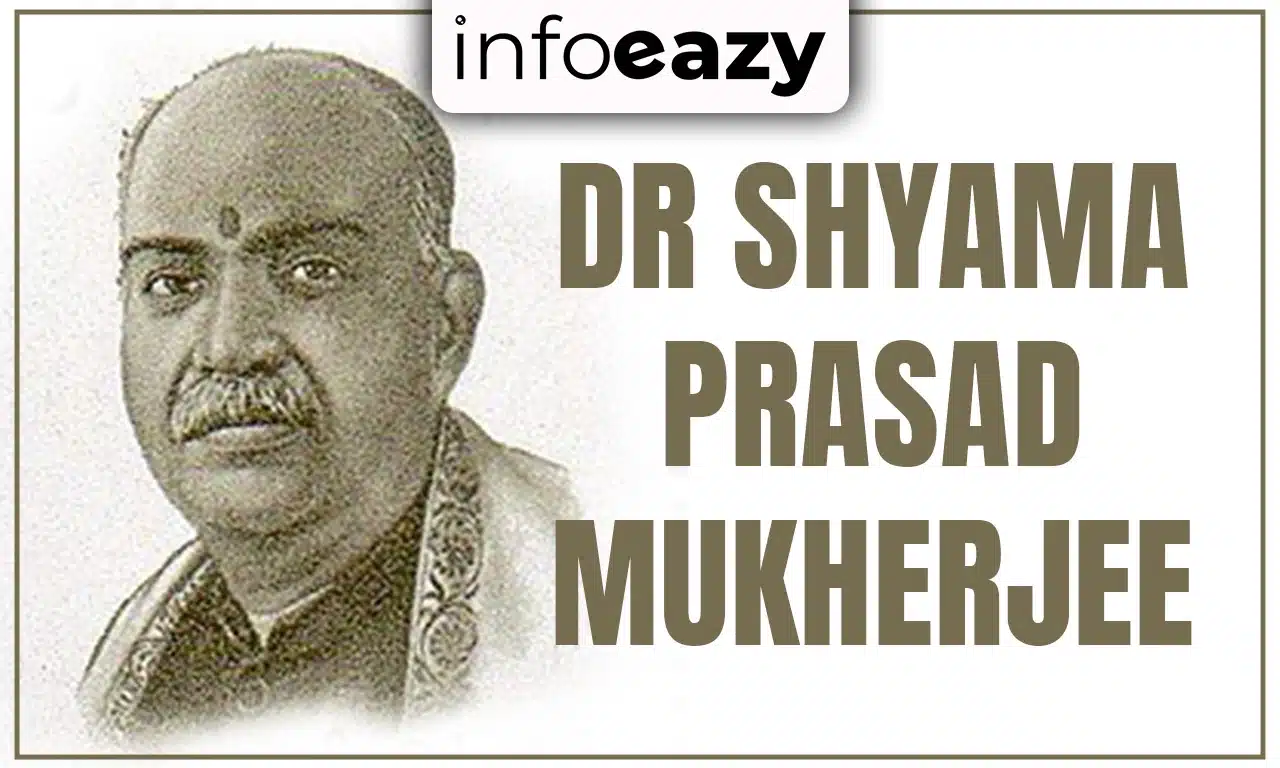Dr. Shyama Prasad Mukherjee was one of the most influential leaders of modern India. He was a politician, educationist, lawyer, and the founder of the Bharatiya Jana Sangh, which later evolved into today’s Bharatiya Janata Party (BJP). Known for his sharp intellect and fearless nature, Mukherjee played a major role in shaping India’s political direction after independence. His contribution to Indian politics, education, and national integrity makes him a significant figure in Indian history.
Dr Shyama Prasad Mukherjee
Dr. Shyama Prasad Mukherjee was more than a politician, he was a visionary who combined his intellect with deep patriotism. His contributions to education, politics, and the idea of a united India remain valuable even today. By founding the Jana Sangh, he laid the foundation for a new political era in India. His life and sacrifice continue to inspire the nation’s democratic and cultural journey.
Biography of Dr Shyama Prasad Mukherjee
Dr. Mukherjee was born on 6 July 1901 in Kolkata, West Bengal, into a highly respected Bengali family. His father, Sir Ashutosh Mukherjee, was a renowned educationist and judge of the Calcutta High Court. Shyama Prasad grew up in an environment of learning and public service, which influenced his path towards academics and politics. He combined his professional excellence with his commitment to national service.
| Personal Information of Dr SP Mukherjee | |
| Aspect | Details |
| Full Name | Dr. Shyama Prasad Mukherjee |
| Born | 6 July 1901, Kolkata, Bengal Presidency |
| Father | Sir Ashutosh Mukherjee |
| Mother | Lady Jogmaya Devi Mukherjee |
| Profession | Lawyer, Educationist, Politician |
| Founded | Bharatiya Jana Sangh (1951) |
| Died | 23 June 1953, Srinagar, Jammu and Kashmir |
Dr Shyama Prasad Mukherjee’s Early Life
Dr. Mukherjee was an exceptionally bright student. He completed his schooling in Kolkata and joined Presidency College, where he stood first in English. Later, he pursued law at Calcutta University, where he also served as a fellow. His academic journey did not end there—he went on to study at Lincoln’s Inn, London, qualifying as a barrister in 1934. This strong educational foundation made him one of the most respected intellectuals of his time.
Dr SP Mukherjee Academic and Educational Career
Shyama Prasad Mukherjee began his career as a lawyer but soon moved into academics. At the young age of 33 years, he became the Vice-Chancellor of Calcutta University, making him one of the youngest persons to hold the post. During his tenure, he encouraged Indian languages, promoted research, and supported young scholars. His efforts left a strong impact on the education system of Bengal and inspired future generations.
Dr Shyama Prasad Mukherjee’s Political Career
Mukherjee’s political journey began in the 1920s when he joined the Bengal Legislative Council as an independent candidate. In 1937, he became the Finance Minister of Bengal Province under the Fazlul Haq government. He actively opposed the dominance of Muslim League politics in Bengal and later resigned in protest. His strong stance against communal politics marked him as a nationalist leader.
Dr SP Mukherjee’s Role in Independence
Before independence, Dr. Mukherjee was active in the Indian National Congress and also associated with the Hindu Mahasabha. He believed in cultural nationalism and worked to unite Hindus in Bengal, especially during the communal tensions of the 1940s. He strongly opposed the partition of Bengal and consistently argued for the protection of Hindu minorities in East Bengal (now Bangladesh).
Dr SP Mukherjee Minister of Industry and Supply
After India’s independence in 1947, Dr. Mukherjee joined Jawaharlal Nehru’s cabinet as the first Minister of Industry and Supply. He worked on industrial policies and emphasized the development of small-scale industries, coal, and steel sectors. However, due to differences with Nehru over issues of Kashmir, minority rights, and Pakistan policy, Mukherjee resigned from the cabinet in 1950.
Dr SP Mukherjee Founder of Bharatiya Jana Sangh
In 1951, Dr. Mukherjee founded the Bharatiya Jana Sangh (BJS), which later evolved into the Bharatiya Janata Party (BJP). His aim was to provide a nationalist alternative to the Congress party. The Jana Sangh focused on cultural nationalism, economic development, and complete integration of Jammu and Kashmir with India. This was one of the most significant contributions of Dr. Mukherjee to Indian politics.
| Timeline of Mukherjee’s Political Career | |
| Year | Event |
| 1934 | Became barrister from Lincoln’s Inn, London |
| 1937 | Finance Minister of Bengal Province |
| 1947 | Minister of Industry and Supply in Nehru’s cabinet |
| 1950 | Resigned from Cabinet |
| 1951 | Founded Bharatiya Jana Sangh |
| 1953 | Died in Kashmir custody |
Dr SP Mukherjee’s Opposition to Article 370 and Kashmir Policy
One of Dr. Mukherjee’s strongest stands was against Article 370, which granted special status to Jammu and Kashmir. He believed that Kashmir should be fully integrated with India without separate provisions. His famous slogan was: “Ek desh mein do vidhan, do pradhan, aur do nishan nahi chalenge” (In one country, there cannot be two constitutions, two prime ministers, and two flags). His protest ultimately led him to Kashmir, where he was arrested and later died in custody.
Death of Dr Shyama Prasad Mukherjee
On 23 June 1953, Dr. Mukherjee died under mysterious circumstances in Srinagar, while in detention for entering Jammu and Kashmir without a permit. His death raised many questions and was widely mourned across India. Many believed that he was deliberately neglected while ill in custody. His sacrifice made him a martyr for the cause of national unity.
Major Contributions of Dr Shyama Prasad Mukherjee
Dr. Mukherjee’s life was marked by contributions to various fields. He was an educationist who modernized Calcutta University, a nationalist leader who opposed communal politics, and a politician who laid the foundation of a new political party. His strong opposition to Article 370 made him a symbol of Indian unity.
| Major Contributions of Dr Shyama Prasad Mukherjee | |
| Field | Contribution |
| Education | Youngest Vice-Chancellor of Calcutta University |
| Politics | Finance Minister of Bengal (1937) |
| Governance | First Industry and Supply Minister of India |
| Party Formation | Founded Bharatiya Jana Sangh (1951) |
| Nationalism | Opposed Article 370 and Kashmir’s special status |
Awards and Recognition of Dr SP Mukherjee
Although Dr. Mukherjee did not receive formal awards during his lifetime, his contributions were widely recognized posthumously. Memorials, institutions, and roads have been named after him. His legacy is carried forward by the Bharatiya Janata Party, which acknowledges him as one of its founding inspirations. Many of the Hospitals including Dr. Shyama Prasad Mukherjee (Civil) Hospital, Lucknow, Uttar Pradesh has been named after him as an honour.
Important Facts about Dr Shyama Prasad Mukherjee
The major facts related to the life and contribution of Dr. Shyama Prasad Mukherjee has been tabulated below for the competitive exams:
| Important Facts about Dr Shyama Prasad Mukherjee | |
| Fact | Details |
| Birth | 6 July 1901, Kolkata |
| Father | Sir Ashutosh Mukherjee |
| Profession | Lawyer, Educationist, Politician |
| Founded | Bharatiya Jana Sangh in 1951 |
| Opposed | Article 370 in Jammu and Kashmir |
| Death | 23 June 1953, Srinagar |
Dr Shyama Prasad Mukherjee FAQs
Q1. Who was Dr Shyama Prasad Mukherjee? +
Q2. When was Dr SP Mukherjee born? +
Q3. What was Dr SP Mukherjee's role in Indian politics? +
Q4. Why did Dr SP Mukherjee oppose Article 370? +
Q5. When did Dr Shyama Prasad Mukherjee die? +
Tags: Dr Shyama Prasad Dr Shyama Prasad Mukherjee Shyama Prasad Mukherjee




